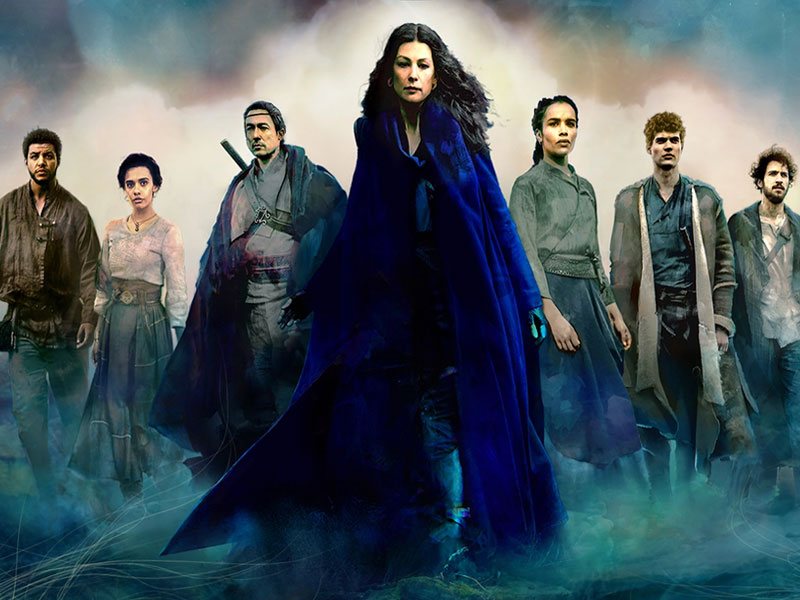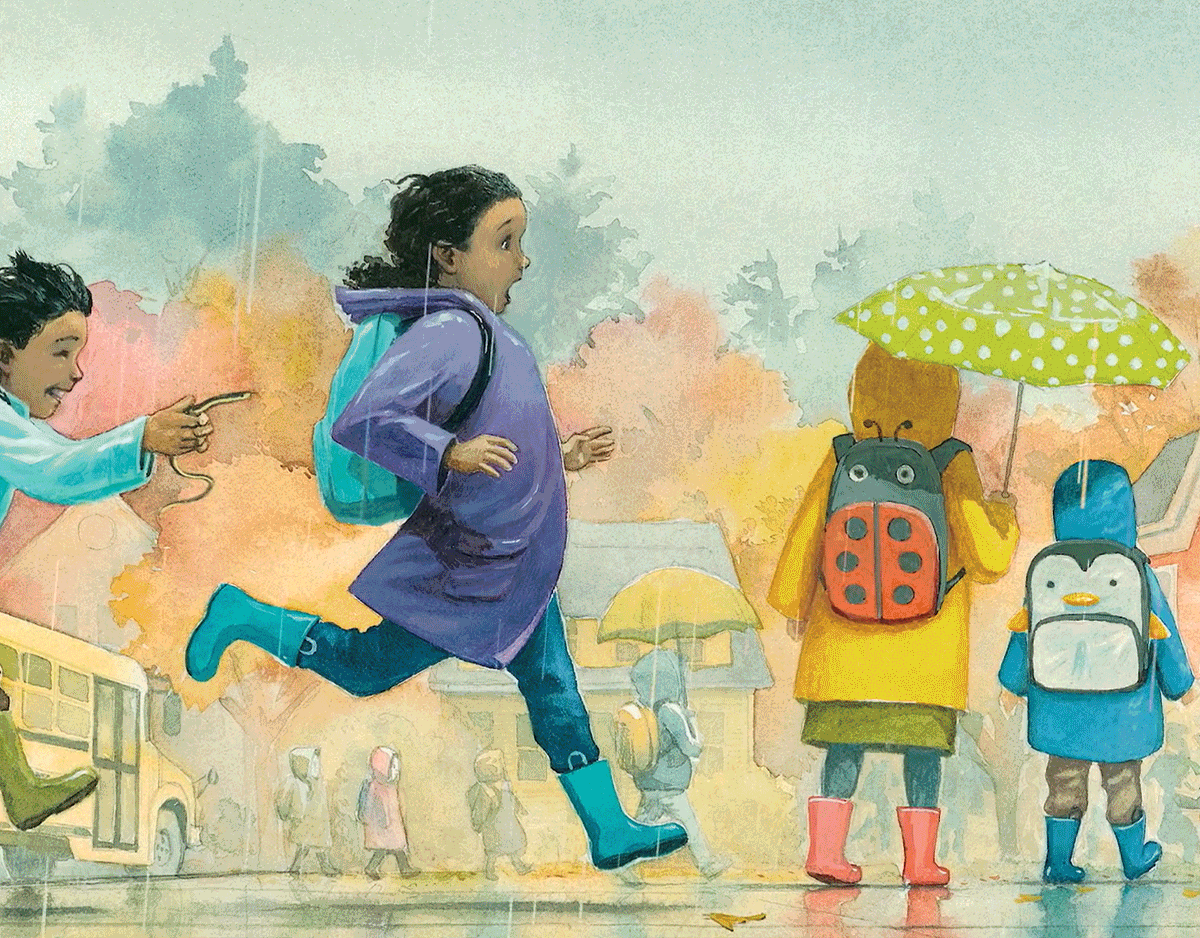Review of the Day: Hokey Pokey by Jerry Spinelli
 Hokey Pokey
Hokey Pokey
By Jerry Spinelli
Alfred A. Knopf (an imprint of Random House)
$15.99
ISBN: 978-0-375-83198-0
Ages 9-12
On shelves now
Not a Jerry Spinelli fan over here. Nope. Some authors you love, some authors you loathe, and some you feel zip, zero, zilch feelings towards whatsoever. That was me and the Spinelli man. Maniac Magee? Nice enough book that did nothing for me. Stargirl? Certainly well written but not my cup of tea. Pull out names like Wringer or Milkweed or Loser and watch as my eyes oh-so-faintly glaze over as I think of what I’ll be cooking dinner tonight or what television shows are clogging up the old DVR. So mine was probably the ideal state in which to encounter a book like Hokey Pokey. It wasn’t that my expectations were low, necessarily. Enough smart folks in the field had been touting and hooting the name of this book ad nauseam to make me ad nauseous. But while I knew this was a high-caliber Spinelli project I probably just thought it would mean reading something like Maniac Magee 2: The Mageeing or something along those lines. I didn’t expect to find a book that does everything Peter Pan is reputed to do, but without the creepy factor. I didn’t expect to get swept up in the metaphor/allegory/what-the-heck-is-this-thing? that is Hokey Pokey itself. So it is that I stand before you with this book in my hand and admit with a little trepidation that it finally happened. I’m a Jerry Spinelli fan. And the reason for it is one of the strongest works of children’s fiction I have ever had the sheer joy to encounter.
It should be just another day in Hokey Pokey. For Jack, it’s his last. Somewhere, deep inside of himself, he knows it. And not just because his beloved bike Scramjet, is now in the possession of his number one most hated rival, the loathed girl Jubilee. No, it’s more than that. When his friends start noticing that the tattoo on his belly, the one on every kid in Hokey Pokey, is starting to fade away, he knows his time is up. Welcome to Hokey Pokey. A wonderland of a place where a kid gets to be a kid for as long as they like, every day. It’s the only place Jack has ever known and now he’s got to go.
ADVERTISEMENT
ADVERTISEMENT
Step One: Establish your world and separate it from Neverland. If this book is one great big allegory for childhood (Publishers Weekly essentially accused the book of being all a dream, which is the dullest interpretation of the story I can think of) then you’d better make it interesting. Childhood ain’t for the weak, after all. It wasn’t until I discussed the book with other adults that I realized that Spinelli essentially makes Hokey Pokey his own childhood. There are tons of kids on bikes (no helmets) and old Warner Brother cartoons on the giant television. Plus there’s Tarzan and not a single video game central to be seen. Writing groups for kids could ask them “What’s your Hokey Pokey” and ask children to describe their own perfect fantasylands. Spinelli’s made his own, but I don’t think kids will necessarily notice. For some reason, Spinelli can put in marbles and an old western pulp feel and who knows what all into this book and you go along with it. Fancy that.
I’m a mom so I read the book as a mother. That’s probably the number one worst way to read this book. I mean talk about a book steeped in nostalgia. People forget that kids love to feel nostalgia for their younger ages. Whether it’s a toddler staring in wonder at pictures of themselves as a baby or a nine-year-old smiling sadly at a six-year-old’s happiness, kids love thinking about the past. It makes perfect sense. As this book shows, the stages of childhood (rather than infanthood) are neatly separated into Gappergums, Longspitters, Newbies, Snotsippers, Sillynillies, etc. A single year in a child’s life provides a whole new universe of experiences! Is it any wonder then that they get nostalgic? When I was a kid I used to love to read Ray Bradbury’s Dandelion Wine because of the feeling it gave me. Now I’m a mom, and so what was my primary concern when I read this book? That if Jubilee is next in line to leave then how’s that going to affect Albert? Trust me when I say that there’s not a kid alive that will think of that. So clearly I am not without my own bizarre filters when I read books for children [though on a related note, how very interesting that Jubilee is allowed to acknowledge her brother in Hokey Pokey but that Jack never acknowledges Kiki. Hm.].
Oh. And did I happen to mention that the writing is rather good? Here I am talking about what the book does without ever getting into the simple matter of what the book IS. And what it IS is good. Spinelli’s not afraid to get a little grandiose in his descriptions if the situation calls for it. As a result you have sentences like, “The dust plume they raised shone golden in the sun, as if a celestial cloud had just then set them down from their home in some paradise of gods.” Earlier Jack mourns his lost in the wake of his rival by yelling. ” `Scraaaaaamjet!’ Jack cries, but his voice is already a hole in the afterwind.” And then there’s the opening sentence . . . but I’ll get to that in a bit.
Spinelli also does some really nice things with legend and community here too. There’s a great short story in The Coyote Road: Trickster Tales” about what happens when the dogs begin to talk. Written by Kij Johnson it’s called “The Evolution of Trickster Stories Among the Dogs of North Park After the Change” and what happens is that the dogs begin to tell tales about One Dog, a creature that’s part of their culture. The same could be said for the children of Hokey Pokey. They come up with stories about The Kid, who is seen as almost the first denizen of Hokey Pokey. In a world without religion, storytelling is the closest these children ever come to spirituality. Spinelli is fascinated with the notion of the stories kids tell one another. It’s the framing sequence for Maniac Magee and now it’s a pivotal plot point for Hokey Pokey.
 The book is not without its occasional flaw, of course. I was a little disappointed to discover that there would be a map included in this book. To me, a map nails down Hokey Pokey too much. It’s better if it’s vague and shifting and the kind of place you picture in your head. But as someone pointed out to me, the advantage of the map is to establish from the get go that Hokey Pokey is not a neighborhood down the street from you. It’s a fantastical place and you’d better be on board with that from page one onward or you are gonna be lost, sucker. So map it is. The book also sort of drops the whole Destroyer subplot, to a certain extent. In the story, Destroyer is younger than Jack and gets his jollies from ruining the happiness of small children. As far as I can ascertain, Destroyer is in this book solely to show the motivations of bullies and how you can defeat them in your own mind. It’s Jack’s counsel to Jubilee’s little brother Albert regarding Destroyer that’s the focus. What that doesn’t take into account, however, is the fact that we were in Destroyer’s head for a very long time. Suddenly we’re booted out, meant to both loathe and pity him, but we’re never allowed back into his head again. For Destroyer there is no happy ending. You get the distinct feeling he cannot wait to get out of Hokey Pokey and when he does (and if he still has no friends) it could be a very bad situation.
The book is not without its occasional flaw, of course. I was a little disappointed to discover that there would be a map included in this book. To me, a map nails down Hokey Pokey too much. It’s better if it’s vague and shifting and the kind of place you picture in your head. But as someone pointed out to me, the advantage of the map is to establish from the get go that Hokey Pokey is not a neighborhood down the street from you. It’s a fantastical place and you’d better be on board with that from page one onward or you are gonna be lost, sucker. So map it is. The book also sort of drops the whole Destroyer subplot, to a certain extent. In the story, Destroyer is younger than Jack and gets his jollies from ruining the happiness of small children. As far as I can ascertain, Destroyer is in this book solely to show the motivations of bullies and how you can defeat them in your own mind. It’s Jack’s counsel to Jubilee’s little brother Albert regarding Destroyer that’s the focus. What that doesn’t take into account, however, is the fact that we were in Destroyer’s head for a very long time. Suddenly we’re booted out, meant to both loathe and pity him, but we’re never allowed back into his head again. For Destroyer there is no happy ending. You get the distinct feeling he cannot wait to get out of Hokey Pokey and when he does (and if he still has no friends) it could be a very bad situation.
ADVERTISEMENT
ADVERTISEMENT
So what the heck will kids get out of this book? Well, the reading will be interesting to watch. A certain strain of child reader will begin to question the world’s internal logic from the get go (i.e. what do the kids eat besides hokey pokeys, how do kids of different ages know that they’re siblings, where do newbies come from, etc.). One might point out that Maniac Magee (again) had ITs own internal logic so this is hardly new territory for Spinelli. Other kid readers will be hugely frustrated by something that doesn’t slot into standard fantasy. Still others will take it at face value and begin to imagine that they’re there. Those are the lucky ones.
There’s also a bit of a debate as to whether or not kids can have this book read aloud to them. I am of the opinion that while it might be chancy if you tried to do it in a group setting, one-on-one would be a better way to go. You have to realize that Spinelli begins this book with a crazy opening worthy of James Joyce (indeed I’ve already heard this book referred to as “the children’s Ulysses“). It’s not impenetrable, just unexpected. We’re all so used to the same kinds of books beginning the same kinds of ways that when we encounter something as unique as a one-page run-on sentence involving Orion and Mooncow and the fall of a lavender star, we’re unprepared. Those kids who read it on their own or read it with a parent and have someone to discuss it with, they might get a lot out of this one. You’ll have to booktalk it so that they get past that first page, but once they’re in, they’ll be in. Hopefully.
“Sometimes the story knows more than the writer.” Madeleine L’Engle said that. I think what she meant was that the reader is going to get something out of a story that might have completely slipped by the writer. And few books for children are as prone to this as Jerry Spinelli’s Hokey Pokey, a book that dares to recast childhood from a time to a place. In interviews Spinelli has said that the main character of this book is childhood itself. It may be divisive, but there’s no denying the writing. Let’s just say this much: Your kids have never read ANYTHING quite like it before. I happen to think that’s a good thing. Try it then.
On shelves now.
Source: Galley copy sent from publisher for review.
Like This? Then Try:
- Doll Bones by Holly Black
- Dandelion Wine by Ray Bradbury
- Criss Cross by Lynne Rae Perkins
Notes on the Cover: Honestly, it’s still too representational for me. See, here was the original:
I could see what they were going for, but since it didn’t make the final cut I can’t say I’m surprised that it was ultimately rejected. This final one is nice and all but a bit too dreamy. Dunno. Can’t say what I really wanted it to be, but not quite that either. We’ll have to see what the paperback comes up with.
Other Blog Reviews:
Professional Reviews:
Interviews:
Filed under: Best Books, Best Books of 2013, Reviews, Reviews 2013
About Betsy Bird
Betsy Bird is currently the Collection Development Manager of the Evanston Public Library system and a former Materials Specialist for New York Public Library. She has served on Newbery, written for Horn Book, and has done other lovely little things that she'd love to tell you about but that she's sure you'd find more interesting to hear of in person. Her opinions are her own and do not reflect those of EPL, SLJ, or any of the other acronyms you might be able to name. Follow her on Twitter: @fuseeight.
ADVERTISEMENT
ADVERTISEMENT
SLJ Blog Network
One Star Review, Guess Who? (#211)
Kevin McCloskey on ‘Lefty’ | Review and Drawn Response
Notable NON-Newbery Winners: Waiting for Gold?
The Seven Bills That Will Safeguard the Future of School Librarianship
Take Five: Newbery Picks, Part Two
Gayle Forman Visits The Yarn!
ADVERTISEMENT









“I didn’t expect to find a book that does everything Peter Pan is reputed to do, but without the creepy factor.” It’s like you’re setting a trap for me…
This review made me cheer. I started reading Hokey Pokey yesterday on one of my bookstore shifts and basically had to get yelled at before I managed to put it down. Now I’m home sick in bed and I am so angry that I didn’t bring it home with me yesterday. I read a couple paragraphs out loud to the philosophy buyer, who happened to be sitting next to me, and he immediately got so excited that he’s dreaming up a whole display around it.
Jonathan, I think you’re going to love it, even without the creep factor. And I think it does sort of beg to be read aloud, maybe under the covers with a flashlight. I wanted to read it out loud even if it was just for my own ears.
I should tip my hat to Jonathan, oh lover of the great kidlit god Pan. I have indeed laid a trap, but probably for myself. It’s not like a person can idly mention Barrie’s book without extreme up close and personal criticism. Boy oh boy I’d love for you to read this and tell me why Pan is different/better, though. I need to hear that conversation. When next are you in NYC?
And Kate, this is good to hear. It’s becoming one of the most divisive books of 2013 already (and we’re, what, a mere two weeks in?) so I figured I had to make my stand early on. Folks will disagree with me, but I’m counting on that. We’re gonna get some GREAT debates around this one this year, I can just feel it.
Boy am I glad they went with the cover they did and not the early version. Can’t imagine how hard I would’ve had to of worked to get a kid to pick that up. As a sometime lover (Magee) and sometime hater (Loser) of Spinelli, I can’t wait to read this. Newbery 2014: Open season!
Love this book, love it, love it, love it. And, Betsy, I think the cover is exactly the right shade of dreaminess. The color! The bike! The clouds! Love it.
You’ve sold me – I just bumped this book into the top position on my “must read” list. Thank you!
Well, I’m a fan of Jerry Spinelli, but not a big fan of books like this. An Abundance of Capital Letters, sentences stuffed with flowery description, and high fantasy in general is not my cup of tea. This seems to be a book that draws very strong opinions–you either really, really like it, or you really, really don’t. We just received our copies, and I’m first in line to read it. 🙂 Looking forward to reading it–and will keep an open mind.
Divisive is the word of the day with this one. I’ll go out on a limb and say it’s the most divisive children’s book of 2013. Yep.
Loved your discussion of how children love nostalgia too, even from very early ages. Beautiful review!
I just want to tell you how much I love this sentence of yours, “In a world without religion, storytelling is the closest these children ever come to spirituality.” Thank you.
Just finished this tonight. Such an exciting way to start off the year. Fantastic, fantastic, fantastic! I read the netgalley arc so when I picked up the finished copy to leaf through at the local bookstore yesterday (when I was only half way through my read) I too was disappointed to see a map was included. I feel like a map of Hokey Pokey allows Hokey Pokey to lose some of its otherworldliness. But regardless, it’s an incredible piece of literature. Can’t wait for the inevitably rewarding reread.
I just finished Hokey Pokey tonight, and spent some time trying to digest it. Both original and strange, it’s a great read. As a big fan of Spinelli, I wondered if others would think as highly of the book. So I was thrilled to read this in your review, the first I turned to online : “And the reason for it is one of the strongest works of children’s fiction I have ever had the sheer joy to encounter.” I wasn’t expecting the emotional wallop; Jack’s final scene is one I won’t soon forget. Unsure whether kids will enjoy it as much as adults, but can’t wait to see what my students think. Thanks Elizabeth.
I was on the fence about reading this book. I’ve heard the title thrown around a good bit, but had only read a few reviews, and all were positive. I was hesitant because I’ve never been a huge Spinelli fan myself. The majority of my students loved his books. I had multiple copies of all of them in my classroom library (many of which disappeared and had to be repurchased each year). I almost always had at least one small group choose to read Maniac Magee. I liked him because my students liked to read his books, but I couldn’t ever really connect to his stories. After reading your review though, this may be a book I could really like. I’m curious about it now–especially now that you’ve attach the word divisive to it! It’s on my TBR list now!
Well I hope it lives up to expectations, Katrina! I should say (and the comments bear this out) that it can be divisive. It’s a love it or hate it title. One thing it’s not: boring. Should be good for discussions.